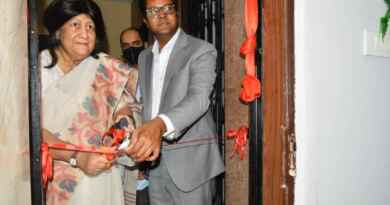National Doctor’s Day 2020: Doctors Speak; therapy, motivation and work-family balance
News Correspondent, abptakmaa, Kolkata, 1st July 2020 : The medical profession is considered one of the noblest of all and history is embossed with stories of doctors giving a new lease of life to crores of people. If anyone was unaware of the contribution that doctors make in the society with their service, the pandemic cleared it all up.
India celebrates its National Doctor’s Day every year on 1st July in the honour of the birth and death anniversary of the great physician and the second Chief Minister of West Bengal, Dr. Bidhan Chandra Roy. While a lot gets spoken about maintaining physical and mental health of patients, it is of utmost importance that doctors feel the same relief as well. Doctors from Fortis Hospital, Anandapur share how they keep their head levelled as they give up a lot of their personal life for the greater good.

Given the dialogue that has opened up surrounding mental health Dr Sanjay Garg, Consultant, Mental Health and Behavioural Science discusses how often doctors go for therapy. He said, “Unfortunately, even today, the term therapy carries a negative connotation and a whole lot of stigma. For doctors, I feel, it is an even greater conundrum since they fear that if they go for therapy, it might make people perceive them as somehow unfit for their profession. This could not be farther from the truth. For most doctors, therapy may be an excellent choice since most of them have to deal with highly stressful situations on a daily basis. It takes a while maybe to take the first step since that stigma seems to have become so internalised. But, once you do, you realise how helpful it is to have a safe space to vent your difficulties. For me, I would not hesitate to seek the help if needed.”
Dr Joydeep Ghosh Consultant, Internal Medicine at Fortis Anandapur said, “Usually in western countries we see doctors visiting psychiatrists whenever they are bogged down by the stress and responsibility. In India with low doctor to population ratio, working at all times becomes a part of life. It is challenging in the beginning but eventually we become used to it. However, during extreme cases we seek the help of therapists.”
Speaking about motivating factors Dr Garg said, “Motivating factors are very individualised and varied. But what most doctors have in common, I believe, is the desire to help others. Admittedly it is a very heavy responsibility and not all outcomes are positive, but without a doubt, it is extremely satisfying when your hard work puts a smile of relief on another person’s face. There may be tangible perks to this profession, but those I feel are not enough to keep you trudging along such a difficult path.”
“The frontline health workers are now even more prominent during this Covid era. What motivates us is the patient care itself. The disease and the destruction that comes around the doctors is the biggest motivator to heal the patients”, said Dr K.M Mandana, Department of Cardiothoracic Surgery at Fortis Hospital Anandapur.
Doctors are humans and resort to very similar stress relieving techniques as other people do. Unfortunately, for most doctors, the boundary between working and non-working hours often get blurred. Trying to fit in a little bit of physical exercise every day, trying to eat as healthy and in a timely manner as possible, and building a strong social circle of people who understand the demands of the profession help doctors combat stress.
The most difficult areas for a doctor is balancing family and work. Doctors at Fortis said that since illnesses and ailments don’t take time off, most doctors feel they shouldn’t either. It takes a while to work through that guilt and realise that they are not doing anyone any favours by working themselves to a potential burnout. This specially happens at the beginning phases of their careers. However, this can sometimes become a bit harmful since the first rule for caregivers is to care for themselves first. At the end of the day they have to realised, as clichéd as it may sound, that this profession is a marathon, not a sprint. The focus needs to be on sustenance and wellbeing.



